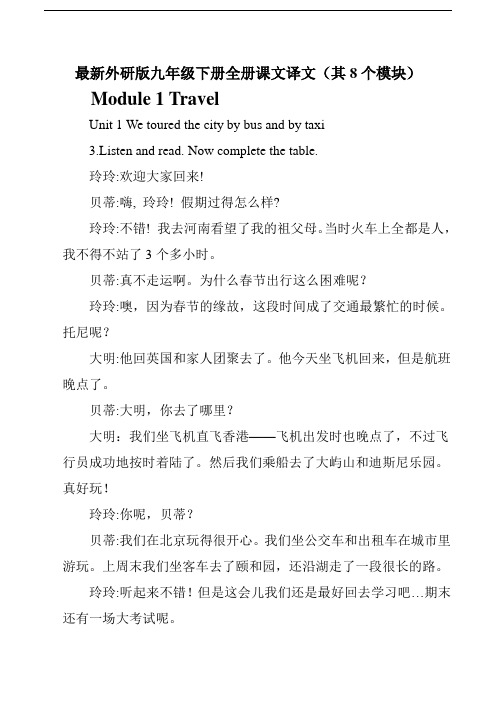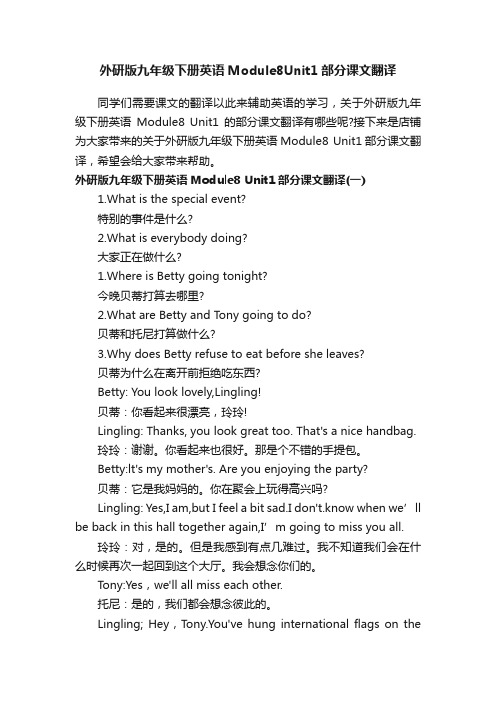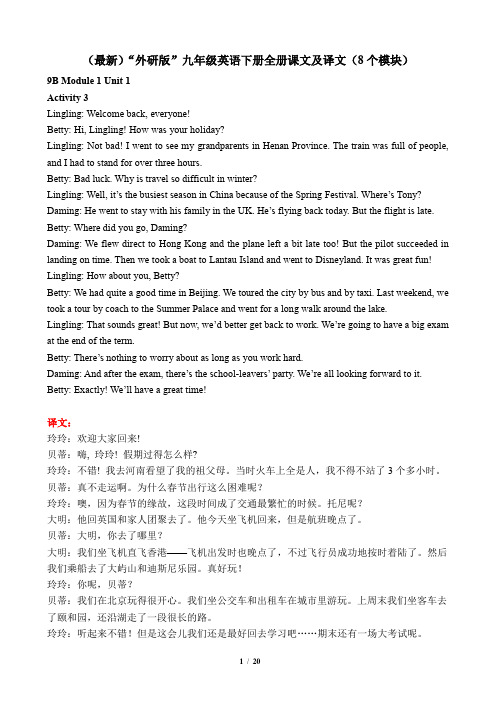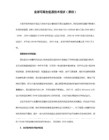(完整版)外研版九年级英语下册(课文及对话)
外研版九年级下册英语Module7Unit3部分课文翻译

外研版九年级下册英语Module7Unit3部分课文翻译在外研版九年级下册英语Module7 Unit3的课程即将到来,同学们要掌握哪些部分课文翻译呢?接下来是店铺为大家带来的关于外研版九年级下册英语Module7 Unit3部分课文翻译,希望会给大家带来帮助。
外研版九年级下册英语Module7 Unit3部分课文翻译(一) Language practice语言练习lt's also the subject that l'm best at,although my spoken English is not that good.它也是我最擅长的科目,尽管我的英语口语不是那么好。
I can speak English with you whenever we meet.无论何时我们见面,我都能和你说英语。
As China continues to grow, many people thinkthat Chinese will become as common as English by the middle of the twenty-first century.随着中国的不断壮大,很多人认为,到21世纪中期,汉语将会变得和英语一样普遍。
I hope I can continue to make progress next year.我希望明年能继续取得进步。
The British, the Indians and the Chinese all help(to) make it a rich language.英国人、印度人和中国人共同将英语变成了一门丰富的语言。
Complete the sentences with the words or expressions in the box. There may be more than one answer.用方框中的单词或短语完成句子。
外研版九年级下册英语Module7Unit3课文翻译(2)

外研版九年级下册英语Module7Unit3课文翻译(2)外研版九年级下册英语Module7 Unit3课文翻译(三)Teacher:Before we start the lesson, everyone,is there anything you're worried about or need help with?老师:同学们,在我们上课之前,你们有担心或者需要帮忙的事吗?Student A:Yes,l'm worried about my handwriting,because it isn't good.学生A:是的,我担心书写,因为它不好。
Teacher:Gcod handwriting (1)___ (recluire)a lot of practice. You need (2)___ (practise) writing the letters and joining them together.0”you work hard,you can (3)___(improve)hIs there anyone else with a problem?老师:好的书写(1)___需要多加练习。
你需要(2)___练习写字母并把它们拼接在一起。
如果你努力练习的话,你会(3)___提高的。
还有其他人有问题吗?Student B:l want (4)___(achieve) higher marks in spelling. lt's so. difficult!学生B:我想在拼写方面(4)___取得更嵩的分数。
这太难了!Teacher: Yes, English spelling is difficult. You need to have a good knowledge of the way that words are (5) (write).For example,remember that the word "letter" has double "t" in if.老师:是的,英语拼写很难。
外研版英语九年级下册全册课文译文

最新外研版九年级下册全册课文译文(其8个模块)Module 1 TravelUnit 1 We toured the city by bus and by taxi3.Listen and read. Now complete the table.玲玲:欢迎大家回来!贝蒂:嗨, 玲玲! 假期过得怎么样?玲玲:不错! 我去河南看望了我的祖父母。
当时火车上全都是人,我不得不站了3个多小时。
贝蒂:真不走运啊。
为什么春节出行这么困难呢?玲玲:噢,因为春节的缘故,这段时间成了交通最繁忙的时候。
托尼呢?大明:他回英国和家人团聚去了。
他今天坐飞机回来,但是航班晚点了。
贝蒂:大明,你去了哪里?大明:我们坐飞机直飞香港——飞机出发时也晚点了,不过飞行员成功地按时着陆了。
然后我们乘船去了大屿山和迪斯尼乐园。
真好玩!玲玲:你呢,贝蒂?贝蒂:我们在北京玩得很开心。
我们坐公交车和出租车在城市里游玩。
上周末我们坐客车去了颐和园,还沿湖走了一段很长的路。
玲玲:听起来不错!但是这会儿我们还是最好回去学习吧…期末还有一场大考试呢。
贝蒂:只要你努力,就没什么好担心的。
大明:考试之后就是毕业晚会了。
我们都盼着呢!贝蒂:没错!我们会玩得很开心的!Unit 2 It’s a long story .2.Read the play and number the expressions in Activity 1 in the order they appear.(李林和李薇在车站站台上告别。
)李林:告诉爸爸妈妈我会想他们的……我也会想念你们所有人。
李薇:我们也会想你的。
李林:春节见。
李薇:保重。
再见!(李林上了车,寻找他的座位。
)李林:对不起,先生。
恐怕你坐了我的座位。
长者:对不起,年轻人。
你说什么?我听不大清楚。
李林:你坐错位置了。
长者:真的吗?但是……我以为这是我的座位呢。
我的票呢?(长者在口袋里、包里,最后又在钱包里翻找他的车票。
)长者:找到了。
外研版九年级下册英语Module8Unit1部分课文翻译

外研版九年级下册英语Module8Unit1部分课文翻译同学们需要课文的翻译以此来辅助英语的学习,关于外研版九年级下册英语Module8 Unit1的部分课文翻译有哪些呢?接下来是店铺为大家带来的关于外研版九年级下册英语Module8 Unit1部分课文翻译,希望会给大家带来帮助。
外研版九年级下册英语Module8 Unit1部分课文翻译(一)1.What is the special event?特别的事件是什么?2.What is everybody doing?大家正在做什么?1.Where is Betty going tonight?今晚贝蒂打算去哪里?2.What are Betty and Tony going to do?贝蒂和托尼打算做什么?3.Why does Betty refuse to eat before she leaves?贝蒂为什么在离开前拒绝吃东西?Betty: You look lovely,Lingling!贝蒂:你看起来很漂亮,玲玲!Lingling: Thanks, you look great too. That's a nice handbag.玲玲:谢谢。
你看起来也很好。
那是个不错的手提包。
Betty:lt's my mother's. Are you enjoying the party?贝蒂:它是我妈妈的。
你在聚会上玩得高兴吗?Lingling: Yes,I am,but I feel a bit sad.I don't.know when we’ll be back in this hall together again,I’m going to miss you all.玲玲:对,是的。
但是我感到有点几难过。
我不知道我们会在什么时候再次一起回到这个大厅。
我会想念你们的。
Tony:Yes,we'll all miss each other.托尼:是的,我们都会想念彼此的。
(最新)“外研版”九年级英语下册全册课文及译文(8个模块)

(最新)“外研版”九年级英语下册全册课文及译文(8个模块)9B Module 1 Unit 1Activity 3Lingling: Welcome back, everyone!Betty: Hi, Lingling! How was your holiday?Lingling: Not bad! I went to see my grandparents in Henan Province. The train was full of people, and I had to stand for over three hours.Betty: Bad luck. Why is travel so difficult in winter?Lingling: Well, it’s the busiest season in China because of the Spring Festival. Where’s Tony? Daming: He went to stay with his family in the UK. He’s flying back today. But the flight is late. Betty: Where did you go, Daming?Daming: We flew direct to Hong Kong and the plane left a bit late too! But the pilot succeeded in landing on time. Then we took a boat to Lantau Island and went to Disneyland. It was great fun! Lingling: How about you, Betty?Betty: We had quite a good time in Beijing. We toured the city by bus and by taxi. Last weekend, we took a tour by coach to the Summer Palace and went for a long walk around the lake.Lingling: That sounds great! But now, we’d better get back to work. We’re going to have a big exam at the end of the term.Betty: There’s nothing to worry about as long as you work hard.Daming: And after the exam, there’s the school-leavers’ party. We’re all looking forward to it. Betty: Exactly! We’ll have a great time!译文:玲玲:欢迎大家回来!贝蒂:嗨, 玲玲! 假期过得怎么样?玲玲:不错! 我去河南看望了我的祖父母。
外研版(2013审定版)9年级下册英语课文Module1、Module2

Yes. The People's Republic of China was founded on 1st October 1949. People have celebrated the National Day since then.
是的,中华人民共和国是在1949年10月1日建立的。人们自从那时起就开始庆祝国庆节了
它大约2300米长,185米高,顶部15米宽。
It produces electricity for millions of people in China.
它为中国无数人提供电力。
Now, who'd like to call first?
现在,谁想先打电话?;
============================
While we're staying with our friends, we're going to spend one day in Qingdao. When is your national day, Betty'?
在和我们的朋友待在一起的时候,我们打算在青岛度过一天的时间.贝蒂,你们的国庆节是什么时候?
我俯视科罗拉多河,一条在我下方差不多一英里的银色的溪流。
Then I looked across to the other side of the canyon.
如果你把世界上最高的两座建筑物叠放在峡谷的底部,它们仍然不能达到顶部。
It was about fifteen miles away, maybe more.
在我下面的远处,地面(仿佛在随光线)向下延伸,逐渐退落,(显露出谷底的)河流。
九下英语课文外研版
九下英语课文外研版下面是九年级下册英语课文的教材外研版(牛津版):1. Unit 1 Friendship- Lesson 1 I have a new friend- Lesson 2 What does friendship mean?- Lesson 3 Making friends2. Unit 2 Growing up- Lesson 1 I'm going to be a basketball player- Lesson 2 Growing pains- Lesson 3 When my sister turned three3. Unit 3 Teenagers should be allowed to choose their own clothes - Lesson 1 Fashion- Lesson 2 Teenage fashions- Lesson 3 A questionnaire4. Unit 4 I used to be afraid of the dark- Lesson 1 Theodore Roosevelt- Lesson 2 Fear- Lesson 3 A haunted house5. Unit 5 We're getting a new library- Lesson 1 Colin is moving- Lesson 2 A new school library- Lesson 3 The Book Fair6. Unit 6 A charity walk- Lesson 1 Volunteering- Lesson 2 A charity walk- Lesson 3 Around the world look7. Unit 7 People who changed our world- Lesson 1 The Wright brothers- Lesson 2 Helen Keller- Lesson 3 A famous inventor8. Unit 8 The story of my village- Lesson 1 A lovely village- Lesson 2 Childhood stories- Lesson 3 A souvenir from the village9. Unit 9 The world in our hands- Lesson 1 Recycling- Lesson 2 Pollution- Lesson 3 Be ready for emergencies10. Unit 10 A letter to a pen pal- Lesson 1 Making friends online- Lesson 2 Planning a trip- Lesson 3 Writing a letter以上就是九年级下册英语课文外研版的内容。
外研版九年级下册英语RevisionModuleA部分课文翻译
外研版九年级下册英语RevisionModuleA部分课文翻译翻译既是一门技巧,又是一门艺术,关于外研版九年级下册英语Revision ModuleA部分的课文翻译有哪些呢?接下来是店铺为大家带来的关于外研版九年级下册英语Revision ModuleA部分课文翻译,希望会给大家带来帮助。
外研版九年级下册英语Revision ModuleA部分课文翻译(一) Conversation A会话A1.What does John think about fishing?约翰认为钓鱼怎么样?a)lt is fun and exciting.有趣而且令人兴奋。
b)lt is a weekend hobby.那是个周末爱好。
c)lt is not interesting.没有趣。
2.Who caught the most fish;n the fishing competition?在钓鱼比赛中谁抓到的鱼最多?a)John.约翰。
b)John's mother.约翰的母亲。
c)Johns father.约翰的父亲。
3.What did John's mother catch?约翰的母亲抓到了什么?a) The smallest fish.最小的鱼。
b) The nicest fish.最好的鱼。
c) The biggest fish.最大的鱼。
Conversation B会话B4.What is wrong with Tony?托尼怎么了?a)He has gota headache.他头痛。
b) He has got a fever。
他发烧了。
c)He has got a bad cold.他得了重感冒。
5.What did the doctor say?医生怎么说?a)He had a fever.他发烧了。
b) He was all right他没事。
c)lt was nothing serious.没什么严重的。
外研版九年级下册英语Module7Unit2部分课文翻译
外研版九年级下册英语Module7Unit2部分课文翻译外研版九年级下册英语Module7 Unit2部分课文翻译(一) where they are它们所在的地方what languages you can see你能看到的语言1.How many people in the world use English?世界上有多少人使用英语?2.How did English bee an international language?英语是如何成为一门国际语言的?3.When do you think Chinese will bee an international language?你认为什么时候汉语会成为一门国际语言?4.Who owns English?谁拥有英语?Who owns English?谁拥有英语?English is spoken by about 400 million people,mostlyin the US, the UK, Canada, Australia, New Zealand and South Africa. In Ghana,India and Singapore , Englishis used as a working language, for example, between bosses and secretaries and between doctors and patients,although there are other languages for everyday use.In China and many other countries,English is the. most important toreign language that children learn at school, because when they grow up, it will be quite possible for them to meet people from other countries. They will need a mon language to municate with each other. English is now used by nearly a quarter of the world's population,and anywhere you go in the world,there is a good chance that you will meet someone who speaks English.大约有4亿人说英语,主要在美国、英国、加拿大、澳大利亚、新西兰和南非。
最新外研版九年级英语下册课文翻译
最新外研版九年级下册全册课译文(其8个模块)Module 1 Travel Unit 1 We toured the city by bus and by taxi3.Listen and read. Now complete the table.玲玲:欢迎大家回来!贝蒂:嗨, 玲玲! 假期过得怎么样?玲玲:不错! 我去河南看望了我的祖父母。
当时火车上全都是人,我不得不站了3个多小时。
贝蒂:真不走运啊。
为什么春节出行这么困难呢?玲玲:噢,因为春节的缘故,这段时间成了交通最繁忙的时候。
托尼呢?大明:他回英国和家人团聚去了。
他今天坐飞机回来,但是航班晚点了。
贝蒂:大明,你去了哪里?大明:我们坐飞机直飞香港——飞机出发时也晚点了,不过飞行员成功地按时着陆了。
然后我们乘船去了大屿山和迪斯尼乐园。
真好玩!玲玲:你呢,贝蒂?贝蒂:我们在北京玩得很开心。
我们坐公交车和出租车在城市里游玩。
上周末我们坐客车去了颐和园,还沿湖走了一段很长的路。
玲玲:听起来不错!但是这会儿我们还是最好回去学习吧…期末还有一场大考试呢。
贝蒂:只要你努力,就没什么好担心的。
大明:考试之后就是毕业晚会了。
我们都盼着呢!贝蒂:没错!我们会玩得很开心的!Unit 2 It’s a long story . 2.Read the play and number the expressions in Activity 1 in the order they appear. (李林和李薇在车站站台上告别。
)李林:告诉爸爸妈妈我会想他们的……我也会想念你们所有人。
李薇:我们也会想你的。
李林:春节见。
李薇:保重。
再见!(李林上了车,寻找他的座位。
)李林:对不起,先生。
恐怕你坐了我的座位。
长者:对不起,年轻人。
你说什么?我听不大清楚。
李林:你坐错位置了。
长者:真的吗?但是……我以为这是我的座位呢。
我的票呢?(长者在口袋里、包里,最后又在钱包里翻找他的车票。
- 1、下载文档前请自行甄别文档内容的完整性,平台不提供额外的编辑、内容补充、找答案等附加服务。
- 2、"仅部分预览"的文档,不可在线预览部分如存在完整性等问题,可反馈申请退款(可完整预览的文档不适用该条件!)。
- 3、如文档侵犯您的权益,请联系客服反馈,我们会尽快为您处理(人工客服工作时间:9:00-18:30)。
Module 1 Unit One The flight was late.Lingling: Welcome back, everyone!Betty: Hi Lingling! How was your holiday?Lingling: Not bad! I went to Henan Province. But the trip back was very long. The train was full of people, and I had to stand for over six hours.Betty: Bad luck. Where's Tony?Daming: He's staying with his family in the UK, and flying back tomorrow. The flights were late today.Betty: Why is travel so difficult in winter?Lingling: Well, it's the busiest season in China because of Spring Festival. Where did you go, Daming?Daming: We flew to Hong Kong—and the flight was late! But we took the boat to Landau Island and went to Disneyland.Lingling: How about you, Betty?Betty: We had quite a good time in Beijing. We went sightseeing by bus and by taxi. And last weekend, we took a tour by coach to the Summer Palace and went for a long walk.Daming: And now, better get back to work ... We've got exams at the end of the term.Betty: Yes, but there are plenty of fun things to do this term ... the school trip ...Lingling: ... and the school leavers' party ...Daming: ... the visit to the English-speaking theatre in Beijing ...Lingling: And our trip to Los Angeles! We'll have a great time!Unit Two Excuse Me. You're Sitting in My Seat!The train to Beijing! Lin often dreamed about the train, and about going to the capital. Now it was in front of him, to set off soon. He looked at his brother. "Don't forget where you come from, little brother," Jin said. "And watch your bags carefully."Lin nodded, unable to speak. This was his first long trip by train at the start of his new life, leaving his village and his home for the last 16 years.He held Jin in his arms. With tears in his eyes, Jin pushed Lin away. "Go, brother. Write to us as soon as you get there, OK?"Lin jumped onto the train. There were people and bags everywhere. He pushed past them towards his seat.A young man was sitting in Lin's seat. He was wearing jeans and a very smart jacket, and was smoking a cigarette.What should he do? Six pairs of eyes looked at Lin, while the man looked out of the window."Sir, you're sitting in my seat," Lin said, with a nervous smile. The other people watched with interest.The man didn't turn to look at Lin, but just looked out of the window. "Excuse me. I have a ticket with the number of the seat you're sitting in!" Lin said in a stronger voice."I also have a ticket with that number—though it is in another car. Besides, I was here first," said the man, without moving his head. Though he was sitting, he looked very tall and strong.Lin looked at the other passengers for help. "But ... " he started to say."But what?" The man turned and looked at Lin. "I'm not moving."Finally a man wearing glasses spoke in a loud voice. "This young man has the right ticket for that seat. You should move."Lin felt brave. "See? Please move. I've got a long way to go.""How long?" the young man asked."To the last stop, Beijing.""I'm getting off before you. Then you can have my seat. ""Where is that?" asked Lin."Hangzhou."Lin thought Hangzhou was far away."It's seven hours away from here," the man with glasses said. "Even if it's only 10 minutes, you should move."Slowly the young man stood up, dropped his cigarette on the floor, and disappeared down the train.Module 2 Unit One It was great to see her again.Betty: Hey, Tony! How was the UK?Tony: Guess what! I saw Sally in London.Lingling: My pen friend Sally?Tony: Yes, Sally, the girl who visited us last year and played in the orchestra.Lingling: Oh, that's fantastic! How is she?Tony: She's fine. It was great to see her again. I really like her.Betty: Did you do anything interesting while you were there? Did you visit her school?Tony: Yes, I did. She took me there herself.Betty: What's it like?Tony: Here you are! These are some photos of Park School. I took them myself.Lingling: Let's have a look.Tony: It isn't as big as ours. It's only got about 700 pupils.Lingling: And how many pupils are there in a class?Tony: Thirty.Lingling: Wow! Tony: Most classes have got a computer and Internet. And there are a few science laboratories, and a large library. And there's a swimming pool and a huge sports ground.Lingling: But Sally likes music.Tony: Well, there's a music room, too. And they have a hall for concerts. Lingling: Which school is better, our school or Park School?Tony: Both schools are very nice. And neither school has anything the other hasn't got. But ...Betty: But what ...?Tony: ... but I prefer our school!Daming: I bet we're even better than Park School at English!Lingling: Well, anyway, we're all going to get top grades for English! Unit Two What’s the best thing about school?My School LifeMy name is Sally Maxwell, and I'm 15. I've been at Park School, London since I was 11. If I pass my exams next year, I'll stay here until I'm 18.Park School is a secondary school, about 20 minutes by bike away from home. Before I came here, I went to primary school, near my home. I started primary school when I was five and stayed there for six years.The schoolday is from 8:45 a.m. to 3:15 p.m. We spend the first 10 minutes in our classroom while our teacher checks which pupils are present or absent. Then everyone goes to the main hall. There our head teacher makes a speech and tells us any news about the school. Lessons begin at 9:05 and last for an hour. We have a break at 11:05 until 11:20, then another lesson, then lunch for an hour. We have two more lessons before school finishes. This year I have 11 subjects: maths, biology, chemistry, French, history, geography, music and IT, PHSE, ADT and PE (these stand for Information Technology; Personal Health and Safety Education; Art, Design andTechnology and Physical Education). Fortunately, we don't have exams in every subject. PHSE is about the dangers of drugs and smoking, among other things. In ADT we also do things like learning to cook as well as drawing and design. Some people can do Italian and Spanish instead of French, but no one is learning Chinese ... yet! PE involves physical exercise, basketball, training in the gym and swimming—we're really lucky to have a swimming pool.I took exams when I was 7, 10, and 14 years old. Next year I take my exams in eight subjects, and then I can do between three and five subjects for the exams in my final year.We have a large sports ground where we play football, tennis and do athletics both during and after school hours. After-school activities, such as sports clubs and language societies are popular, too. During the school year there are usually visits to museums and galleries, and to camps for activities, such as climbing and cycling in the country. There are parties and discos and a sports day, and the school play is a really important event. Once a term, there is a parents' meeting, so our parents and teachers can talk about our progress.What's the best thing about school? English, history, music ... and my friends. What's the worst thing? Homework ... and exams!Module 3 Unit One People are healthier today. Betty's mum: It's getting late, Betty.Betty: Nearly finished! I'm doing a composition: Is life today better or worse than it was 50 years ago?Betty's mum: And what do you think?Betty: I think it's better. The most important difference is that people are healthier today, and they live longer than they did in the past. Betty's mum: That's true. The advantage is that we know more about medicine today. We're better at preventing illness. But people don't eat as well as in the past, and don't take as much exercise as they did.Betty: I suppose that's because public transport is much better today. Betty's mum: Yes, I agree. People walk or use their bikes less, and they're lazier. Faster transport also makes more pollution. And that makes life more dangerous and less healthy.Betty: What about work? People don't have to work as hard as they worked 50 years ago.Betty's mum: Yes, but no one ever says they have too much free time! I also think schoolchildren today work harder than we ever did.Betty: Yes, but I really want to do my best.Betty's mum: Why don't you ask Mrs Li downstairs? She's seen how life has changed.Betty: That's a good idea. Talking of free time, don't forget I'm going on the school trip next month, and the theatre visit.Betty's mum: Good! You'll be more relaxed and less nervous before your exams.Unit Two We weren’t very rich, but we were happy.Life in the PastMrs Li is over 70 years old, and has lived in Beijing all her life. I asked her about life today and in the past.Tell me about your parents, brothers and sisters.My parents, my sister and three brothers lived in a small house beside a restaurant. We weren't very rich, but we were happy. My sister was the eldest child and she left school when she was only 12 to help my mother at home.Families have changed a lot since I was young. They were much bigger in those days. Most of my friends had lots of brothers and sisters. Today most people only have one child!Did your parents have jobs?My father went out to work. He was a factory worker, and he often worked 12 hours a day. My mum wanted to work. She was a teacher before she met my father. Looking after us was a full-time job, so she stayed at home. Today it's normal for married women to go out to work, but it was less common in the past. My father had the same job the whole of his working life. These days people change their jobs much more often.What was life like at home?Well, I remember the family meals, three times a day. My mother was always cooking for us. We weren't rich but we ate enough. And the food was always freshly cooked—my mother never bought ready-made food as people do today, so it was much better for us. And of course we didn't have television, so we played games together and read a lot. I helped my younger brother with his homework in the evenings.Where did you meet your husband?I first met him 60 years ago. I was carrying some heavy bags on my bike and I fell off! He stopped and picked up my bags. My parents liked him, and thought he came from a good family so we got married a year later. I was only 19. These days most couples meet at work, and they just hope their parents will be happy for them if they marry.Has Beijing changed?Yes, there are lots more buildings and so much more traffic! I can't believe the number of cars on the streets. But I suppose it's the same everywhere. And I walk less these days and take the bus more.And do you think life is better today?Well, I think so. I'm healthier than I've ever been. We live longer and we eat better. One day I'll be talking to your own grandchildren!Module 4 Unit One I really like these shoes. Lingling: I'm really looking forward to the Shakespeare play.Betty: Me too! And the school trip to the Great Wall.Lingling: Yes, but I need a thick jacket, and some warm gloves and socks. Betty: In May?Lingling: I get really cold.Betty: OK. Let's go shopping!Lingling: How about that new shopping centre in Wangfujing? You know, turn left and go along Wangfujing, and it's on the right.Betty: Sure. We'll go by bus, OK? And have you decided what to wear to the school leavers' party?Lingling: I've got a really nice long dress. What about you?Betty: I'll probably wear a dress, too, but I need some shoes. OK, I'll meet you in front of school at two o'clock this afternoon.(Later.)Betty: How about this jacket?Lingling: It's the right size but it's a bit bright.Betty: Let's see if they have one in blue. Where's the shop assistant? Lingling: It's that girl with long hair over there. Excuse me!Shop assistant: Can I help you?Betty: Yes, do you have this jacket in blue?Shop assistant: No, I don't think so. But we've got some overcoats over here. Come this way.Betty: No, she doesn't want an overcoat.Lingling: Hey, I really like these shoes!Betty: Oh, take a look at that amazing skirt!Lingling: I think we're going to be here for some time.Unit Two What helps you choose the clothes you like?Looking Cool.What do you look for when you go shopping for clothes? Do you choose something fashionable ... or comfortable? Do you like to look different? Or do you wear the same clothes as your friends? Do you go for this year's colours? Is it the logo—the company symbol—that catches your attention? Or maybe film stars are wearing these clothes? What helps you choose the clothes you like?Everyone spends money on clothes, and everyone has their personal look. The best-known clothing companies sell their "designer" clothes all over the world. But the number of these big name companies is in fact very small, and the clothes they make are more expensive than the clothes made by less well-known companies. Many people even prefer them to cheaper clothes. Why?.Many young people today care about the way they look. They often buy "designer" clothes because they think they look cool. Then the less well-known companies make clothes which look the same. But they don't sell as well because they don't have the logo..People also think designer clothes are better made. For example, many people think the right running shoes will make you run faster or play better. Of course, this is not always true. It's the training—not the trainers—that improves your speed or your score. But that's not the point. People believe that it's true ... and then buy the shoes. The big companies only want to make a lot of money..Above all, designer clothes are more popular because of clever advertising. All of the international companies spend millions of dollars every year to make us buy their clothes. And they succeed!Most people dress in a way that shows off their personality. But if some of us buy expensive clothes just to look cool, what does that say about us? Maybe it's just clever advertising.So next weekend, think about the clothes you put on. What's the logo on your trainers? Who made your jeans? And how many of your friends wear the same clothes as you do? And then think that maybe some of us could spend our money better.Unit Three Language in useSelling Without Advertisements1. Advertisements are everywhere! They're on the radio and TV, in newspapers and magazines, on buses and buildings. They're on websites and mobile phones. Companies give their products to film stars, pop stars and sports stars to wear or use so that fans will buy them in order to copy the stars.2. Advertisements have become so common that they aren't working any more. We don't like advertisements, so we try not to see them. We turn off the ads on our computers, we refuse to watch them on TV, or read them in magazines. We no longer notice the posters all around us. We don't copy the stars because we know they don't really like the things they advertise.3. This means that advertising companies need a new way to sell. They can't make their products "cool" by advertising. Advertisements aren't cool, and teenagers won't buy the things in ads just because the ads say they are fashionable. The latest way to advertise is not to advertise.4. Instead of using stars, companies are using teenagers. They pay them to tell their friends about new products. Teenagers don't want to dress like everyone else and buy the things that everyone else has. They want to look different and create their own style. Teenagers don't think it's cool to copy the stars or buy things they've seen in ads.5. Getting people to talk about products is the best way to advertise. When teenagers talk about products, their friends become interested and want to buy them. When "cool" teenagers wear clothes, they make them fashionable, so their friends want to wear them, too.。
